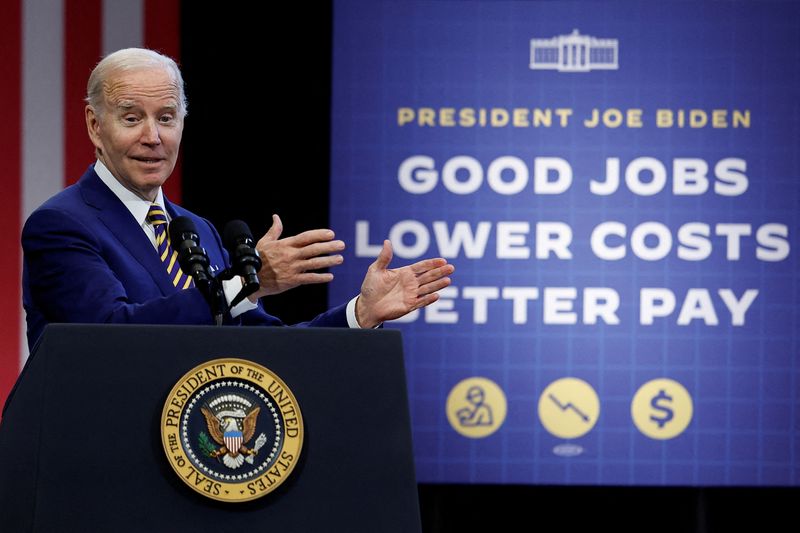By Andrea Shalal
WASHINGTON (Reuters) - U.S. President Joe Biden is using $1.5 trillion in new federal spending to continue his push to reshape the U.S. economy, redirect corporate profits and reverse a decades-old decline in the benefits that go to workers.
With a new team of progressive-leaning economic advisers and a fiscal war chest of three massive spending bills, the Biden administration is using new guidelines to pressure companies to expand childcare, produce more in the United States and hire more equitably.
Every president puts his stamp on how federal money is spent, but Biden was using a broader range of tools, including tax changes, implementation of new legislation and stepped-up anti-trust enforcement to affect change, said Ganesh Sitaraman, who heads a new political economy initiative at Vanderbilt University.
"What Biden and his advisers are doing is solving problems that exist in the economy. They are pushing forward an agenda aimed at building things in America again ... and taking on corporate power," he said.
Biden ran on a major reset of the U.S. economy, and against the idea popularized during the Ronald Reagan era that tax cuts for businesses and the wealthy unleash investment that would "trickle down" to the broader economy.
The Commerce Department on Tuesday rolled out the terms for companies to apply for $52 billion in semiconductor manufacturing subsidies that require them to plan for access to child care for their workers, use low-emission energy sources, limit stock buybacks, and allow their workers to unionize.
The $430-billion Inflation Reduction Act gives the U.S. Treasury oversight of $270 billion in tax incentives, which the agency says it is focusing at clean energy projects that pay workers good wages and hire apprentices. A Department of Energy provision in the act requires companies to focus on workforce training, ensure diversity and engage "environmental justice" communities in planning. And the $1 trillion bipartisan Infrastructure bill is stacked with "Made in America" quotas.
Biden's cabinet will oversee these funds as further legislation action on his economic agenda seems doomed.
Republicans' control of the House of Representatives means proposals in Biden's budget proposal to quadruple the 1% tax on stock buybacks, hit oil companies with a windfall profits tax, and impose a 20% minimum tax on those earning $100 million or more are likely to go nowhere. Key provisions on universal child care and better working conditions for child care workers were stripped out of bills last year.
This year, Biden plans to continue to target what he sees as corporate "profiteering," inflated drug prices and other abuses, Deputy National Economic Council Director Bharat Ramamurti told Reuters. Biden's push against junk fees imposed by airlines had already promoted reversals by some airlines, he noted. On Wednesday Eli Lilly (NYSE:LLY) said it would reduce prices by 70% for its most commonly prescribed forms of the drug, after Biden repeatedly targeted drugmakers over the cost.
"I wouldn't underestimate the bully pulpit," Ramamurti said.
ANTI-BUSINESS ACCUSATIONS
Curtis Dubay, chief economist at the U.S. Chamber of Commerce, the largest business lobby in the world, said Biden's attacks on "corporate greed" and "demagoguery" replayed themes seen during the Obama administration, when many of Biden's top economic advisers were also in government.
Biden's "anti-business" stance was not helpful and the stock buyback tax set a "bad precedent," he said. Many of the White House's aims have widespread voter appeal, though.
Ramamurti and others say companies should not complain, since massive federal investments in broadband, roads, bridges and clean energy them compete, while they facing only marginally higher taxes.
"They've had two great years overall," he said. "We've created an environment that's very hospitable to businesses that want to do things the right way."
U.S. corporate profits as a share of GDP rose to their highest levels since the 1950s in the second quarter of 2022. The country had the largest increase in foreign direct investment of all economies in 2021, the IMF found, a gain of $506 billion or 11.3%.
Aides and economists say they expect Biden's focus on corporate abuses to sharpen as the 2024 election nears, betting on recent polling that shows the issue is continuing to play well with voters.
Ramamurti; Jared Bernstein, Biden's nominee to be chief White House economist; and Joelle Gamble, the Labor Department's top economist, who is also joining the NEC, have all pushed for years to ensure workers get a bigger share of corporate profits.
Julie Su, just tapped to be labor secretary, launched a campaign against "wage theft" by employers as a labor activist.

Even Lael Brainard, former Federal Reserve vice chair and new NEC director, who is sometimes dismissed by progressive groups as too conservative, last October said there was "ample room" for retailers and others to "recompress margins" and ease inflation.
Heather Boushey, another member of the Council of Economic Advisers, told Reuters the new team was all about continuity and would stick firmly to Biden's "economic vision to build an economy from the bottom up and middle out, not the top-down."